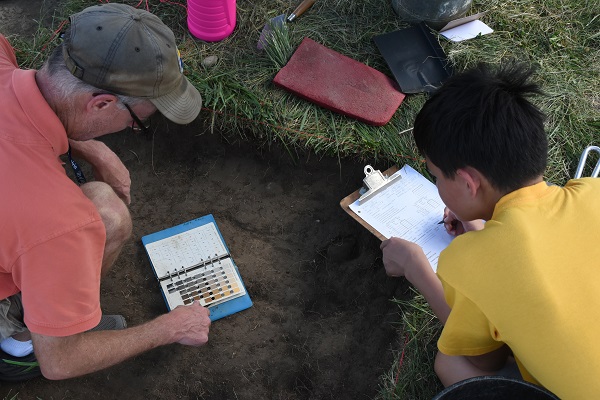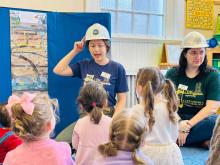
Educational Resources at the Alexandria Archaeology Museum
Arrange a Field Trip or Outreach Lesson

Groups can choose to either visit the museum or have Alexandria Archaeology come to you! Book a program or contact the Office of Historic Alexandria Education Coordinator through Alex311.
If you would like to combine your visit with lessons at other Alexandria museums, please look over our list of sites offering educational programs. The Alexandria Archaeology Museum can accommodate up to 20 students at a time. Large groups may be accommodated by dividing into smaller groups and rotating between museum sites, as many of the historic properties are within easy walking distance of each other. Learn more about Scheduling an Education Program with Historic Alexandria.
All City-owned Museums offer free programs to Alexandria City Public Schools. When making reservations, inquire about the fee structure.
Archaeology Programs

Each program introduces the process of archaeology before having students apply those new skills and knowledge to a specific archaeology site in the city. Participants use real tools, research, and artifacts from the Alexandria Archaeology collection to better understand Alexandria’s past.
Most lessons can be booked either as a field trip or an outreach program. The programs are suitable for school groups, scouts, camps, adult and senior groups. Contact the museum at least two weeks in advance to schedule a lesson.
Lessons are free to Alexandria City Public School groups. Field trip
programs at the Alexandria Archaeology Museum are $3 per person ($40 minimum per program) for all other groups. Group leaders can also arrange combined tours with other Alexandria museums and historic properties.
Adventure Lessons
- Science Underground – Recommended PreK – 1st
How do archaeologists study the past? Learn about the clues beneath your feet and the archaeological methods used to find, sort, and identify artifacts. Available as an outreach lesson. - The Sugar Trade in Alexandria – Recommended grades 2nd – 3rd
What is a Sugar House? Examine artifacts from a site in Alexandria to learn how sugar was made in the 19th century. Learn how archaeologists identify and classify artifacts. Available as an outreach lesson. Activity Sheet - Ship Science – Recommended grades 4th+
Why would a ship be found underground? Use dendrochronology and other scientific methods to uncover the mystery behind Alexandria’s 18th century ship discovered along the waterfront. Available as an outreach lesson. - Hayti: Uncovering an African American Neighborhood – Recommended grades 5th+
Who lived in Hayti in the 19th century? Weave together maps, census records and artifacts from a free Black site to understand the people who lived there. Visit the Alexandria Black History Museum and Freedom House Museum on a combined tour. Available as an outreach lesson.
Alexandria Archaeology Summer Camp

Summer Camp provides an opportunity for 13-15 year-olds to work on a real archaeological dig. Each summer, campers spend a week helping Alexandria’s City archaeologists excavate a real site. Learn professional excavating, recording, and artifact processing methods. Uncover Alexandria’s buried past while protecting the City’s valuable historic resources.
The camp takes place in Alexandria at the Shuter's Hill Site, 101 Callahan Drive, for the majority of the week. Campers will spend one day of the week at the Alexandria Archaeology Museum, 105 N Union Street.
Read our 2019 Summer Camp Newsletter.
Registration for the 2025 camp session is sold out. Email archaeology@alexandriava.gov or call 703.746.4399 if you have any questions.
Internship Opportunities
Internship opportunities are available on a limited basis to students who will receive credit through their colleges or universities, or students who have graduated no more than twelve months before the application deadline. Students usually come from departments of Anthropology, American Studies, Historic Preservation, Public History, Museum Studies and Museum Education. It is the responsibility of each student to make the arrangements to meet their program requirements to receive this credit. For unpaid internships, priority will be given to students seeking credit. Paid internships are limited and will be listed separately below when available.
Interns are selected based on the availability of projects and staff supervisors. If your interests and experience meet current Alexandria Archaeology needs, we will reach out to you for an in-person or virtual interview.
Fall Internships
Application deadline: June 15
Decision notification: July 31
Spring Internships
Application deadline: November 15
Decision notification: December 15
Summer Internships
Application deadline: March 15
Decision notification: April 15
To apply, please submit an Internship Application. Please note that applications require a resume and writing sample. If interested in one of the listed paid internships, please note in the application.
Past internship opportunities have included:
- Conducting documentary research using primary and secondary sources on specific properties or on specific aspects of the City’s historic development
- Assisting in museum education programs, designing exhibitions, or developing new programming or activities that interpret archaeological and historical information to the public
- Conducting archaeological laboratory work
- Assisting in collections management of artifact collections and their documentation, including field notes, records and photographs